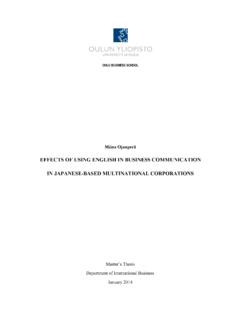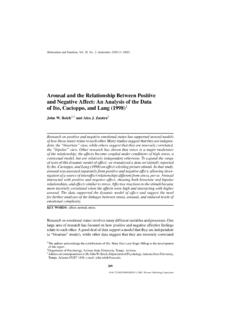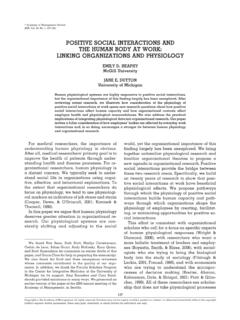Transcription of The role of positive and negative affect - University of Oulu
1 KHAN, IQRA SADAF IMPACT OF EMOTIONAL INTELLIGENCE ON RISK BEHAVIOUR WITH MEDIATING EFFECT OF positive AND negative affect Master s Thesis in Education FACULTY OF EDUCATION Master s Degree Program in Education and Globalisation 2017 Faculty of Education Thesis abstract Department of Educational Sciences and Teacher Education Master's Degree Programme in Education and Globalisation Author Iqra Sadaf Khan Title Impact of emotional intelligence on risk behaviour with mediating effect of positive and negative affect . Major subject Education Type of thesis Master s Thesis Year 2016 Number of pages 56+8 Abstract Emotional intelligence and risk taking behaviour are considered as significant factors through which people engage in organizations and in daily life. This dissertation formulates the linkage between emotional intelligence, positive affect , negative affect and risk taking behavior.
2 The underlying principle of this study was to develop a sense of relationship between emotional intelligence, positive affect , negative affect , and the conduct of risk taking behavior amongst telecom companies providing the call center services in Pakistan. Afterwards mediating affect of positive and negative affect was checked in the proposed emotional intelligence-risk behavior relationship. Current study was conducted in three big cities of Pakistan (Islamabad, Lahore and Rawalpindi). The technique of convenience sampling was used to collect the data through questionnaires from call center agents. The research design was cross-sectional, and total of 202 finalized and usable responses were used as sample size. In time one 300 questionnaires were used as sample size, and similarly 300 questionnaires were distributed in second time for data collection.
3 Correlation, regression, and descriptive statistics were used to analyze the data. All hypotheses were accepted and it was proved that positive and negative affect mediate the emotional intelligence to risk behavior relationship. Moreover, current research highlights the areas where future research can be done in different context by involving several other constructs with risk taking behavior. Keywords emotional intelligence, positive affect , negative affect , risk taking behavior ACKNOWLEDGEMENTS All acknowledgments to ALLAH who is creator of this whole universe, as He gave me strength, knowledge, skills and opportunities to cope up with all the matters related to this research documents. I express my special gratitude for the suggestions and changes made by Dr.
4 Maria J rvel , Dr. Jouni Peltonen, and Jorin Carpels for their critical and novel comments in my research proceeding. I also wish to thanks Noureen Fatima, very close friend of mine, who have been very supportive in the compilation of this document. My research supervisor Dr. Maria J rvel , has been very helpful and co-operative in the development of my thesis, and was guiding me at every stage of the proceedings; Her role is specially acknowledged for bringing quality to this work. I am very thankful to my family too as their prayers and support has helped me throughout my work. "Knowing others and knowing oneself, in one hundred battles is no danger. Not knowing the other and knowing oneself, one victory for one loss. Not knowing the other and not knowing oneself, in everybattle is certain defeat." Sun Tzu, The Art of War (page.)
5 01) CONTENTS 1 INTRODUCTION .. 1 Background and Research Gap .. 1 Problem Definition in Pakistani Context .. 4 Sample/Respondents .. 5 Significance of the Study .. 6 Objectives of the Study .. 6 Research Questions .. 7 2 LITERATURE REVIEW .. 8 Emotional intelligence .. 8 Mayer and Salovey model of Emotional Intelligence: Perception, Interpretation, Understanding and Management .. 10 The Definition of Risk .. 13 Risk as a Factor in 14 Emotional Intelligence and Risk Taking Behavior .. 17 Role of positive and negative affect .. 19 positive affect , negative affect and Risk Taking Behaviour .. 21 Role of positive affect and negative affect .. 23 3 METHODOLOGY .. 27 Research Design .. 27 Sample, Data Collection Procedures and scale Measures .. 27 Instruments .. 28 Data collection method and data analysis techniques.
6 30 4 RESULTS .. 31 Descriptive Statistics and Correlations .. 31 Regression Results .. 32 5 DISCUSSION AND 39 Discussion on results .. 39 Practical implications .. 42 Limitations and Future research .. 43 Conclusion .. 44 6 REFERENCES .. 45 APPENDIX 1: EVIDENT STUDIES .. 57 APPENDIX 2: TIME 1 QUESTIONNAIRE .. 58 APPENDIX 3: TIME 2 QUESTIONNAIRE .. 62 1 INTRODUCTION Background and Research Gap In social and organizational psychology, Emotional Intelligence (EI) is considered as an emerging concept in the context of affective revolution (Barsade & Gibson 2007), which is considered an essential predictor of organizational outcomes and gaining popularity in almost all the fields. The founders of the term Peter Salovey and John Mayer (1990) defined emotional intelligence (EI), as the capability to deal with relationships and feelings.
7 Furthermore, the founders of the term put forward a four-factor model of emotional intelligence that included emotional perception, emotional elucidation, emotional understanding and management of emotions. We can say that importance of emotions in life are two folds. First, emotions can affect learning processes as it has the ability to stumble upon how we process information. Second, in order to get success, emotional intelligences stresses upon the management of relationships and feelings in a positive way. The term emotional intelligence can be taken as the expanded version of the theory of multiple intelligence in which he defines intrapersonal and interpersonal intelligence as the dealing criteria to self and others respectively (Gardner, 1999). Emotional Intelligence refers to an individual s capability to deal efficiently with variety of emotions that is generally recognized as an important human attribute.
8 Emotional intelligence (EI) is the study of the emotions from their arousal to the decision taken during any particular affective state. Damasio in 1994 presented the importance of emotions and affect in decision making. Damasio stated that thought is developed generally from images. Learning of life time leads these symbolic pictures to befall marked by creating a link between positive and negative feelings and bodily situations or certain realities 2 which may in turn effect their reaction of being risk averse or risk to make any decision, people tend to think about the probable, consequential feeling they are going to have as the outcome after they make the decision. Kahneman & Frederick (2002) explained affect as two way theory of thinking processes which involves information and knowing procedures that play a dynamic role in identified deriviations.
9 Slovic et al. (2004), described affect as the particular class of goodness or badness . Basically there are two approaches recognized by Slovic et al. (2004); firstly experience as a feeling state which can be with or without consciousness and secondly eestablishing an optimistic or adverse quality of stimulus. The importance of the affect is well known by researchers who use decision and regret theories to justify the fact that feelings cannot be directly measured as emotions infer from available choices. Similarly, Miller, Schwart and Ritov (1997) stated that choice between risky options can be described as the maximization of expected emotional experience. To explain, people choose the risky options for which they expected to feel better. Therefore the significance of emotional intelligence concerning its possible protective role against negative affect and positive affect in case of risk taking and risk aversion decision is an emerging phenomenon.
10 affect can have an adaptive utility, closely bounded to risk taking behavior. Individuals may therefore show variations in behavior over different situations. Individual demonstrate variations in behaviors according to different situations and timings. That is why there are different preferences for risk, for instance, the varying demographics such as age, marital status, gender, and occupation (Brumiley & Curley, 1992, p12). Specifically to this study, it is stated that while maintaining the quality of service sector, changes in the state of affect may cause bias in risky behavior. Research proposes that employees showing of emotions can influence customers emotional states and satisfaction (Hennig et al., 2006). Furthermore Hennig added that when people have a clear awareness of who they are and who they are becoming, by strengthening the ability to response to everything that happens people can build a rational decision.















